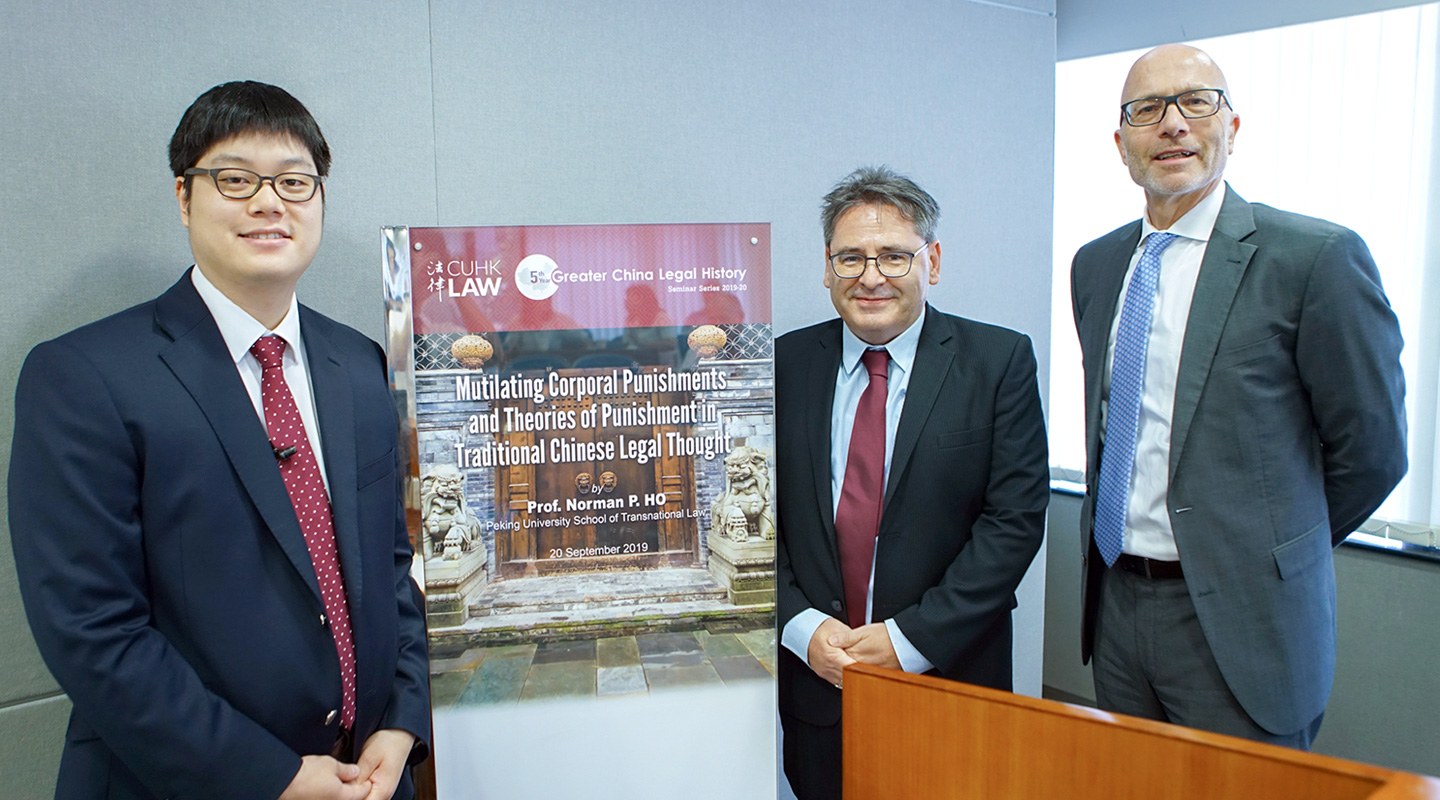Dear readers, With the launch of e-newsletter CUHK in Focus, CUHKUPDates has retired and this site will no longer be updated. To stay abreast of the University’s latest news, please go to https://focus.cuhk.edu.hk. Thank you.
To Maim or Not To Maim?
Analysing the penal pendulum in traditional Chinese legal thought

The Greater China Legal History Seminar Series offered by the Faculty of Law, built upon the success of the Chinese Customary Law Seminar Series in 2014–16, has been extremely popular and impactful. It is the brainchild of Prof. Lutz-Christian Wolff, Dean of Law and Wei Lun Professor of Law and Prof. Steven Gallagher, Associate Dean (Teaching and Learning) of the Faculty of Law.
Professor Wolff said, ‘Through this seminar series the Faculty of Law of CUHK has been able to establish a highly respected forum for the intellectual exchange between parties from all walks of life on legal history and its impact at present and in the future. The series has fostered a vibrant knowledge transfer back and forth between academia and the legal profession. Its success also demonstrates our Faculty’s academic leadership in the Greater China region.’
The fifth season kicked off with a sometimes macabre but always thought-provoking lecture given by a returning speaker. On 20 September, Prof. Norman P. Ho of the Peking School of Transnational Law in Shenzhen and an expert on pre-modern Chinese legal history and legal theory delivered a talk titled ‘Mutilating Corporal Punishments and Theories of Punishment in Traditional Chinese Legal Thought’ to a packed lecture hall in the Faculty’s town centre in Admiralty.
Mutilating Corporal Punishments (MCPs) go back almost 4,000 years in the Shang dynasty when tattooing (inscription on the face of the offender), amputation of the nose or either or both of the legs, castration and death were practised on offenders. MCPs were officially abolished in 167 BC by the Confucianism-advocating Emperor Wen (r. 180–157BC) of the Han dynasty. During Han and the subsequent dynasties, mutilation was gradually replaced by less severe or permanent forms of corporal punishments such as beating and head-shaving. But throughout the millennium since their abolitions, legal and jurisprudential debates on MCPs and appeals for their reinstatement went on.
Ingenious arguments had been advanced by both the anti-MCP and the pro-MCP camps. Central to the argument of the former is that the carving of visage or the maiming of limbs is irreversible and hence precludes redemption. Emperor Wen took pity and asked himself: ‘When the mutilating punishments are applied, members are cut off and the skin is carved, (so that) to the end of one’s life they will not grow (again). How painful are these punishments and how unvirtuous (am I). How could this ever correspond to the idea of “being the father and mother of the people”?’ 1
Emperor Wen was echoed in subsequent centuries by, among others, Kong Rong (153–208 AD) and the famous Tang poet Bai Juyi (772–846 AD). Some even argued that MCPs have little effect on the prevention of crimes or the eradication of evil.
Advocates for the reinstatement of MCPs include Ban Gu (32–92 AD), Liu Song (d. 300 AD) and the great neo-Confucian scholar Zhu Xi (1130–1200 AD). Interestingly, many of these did not want to reinstate MCPs just to inflict pain and make the stigma permanent. They saw the lack of MCPs creating a penal void in which not-so-serious crimes do not find fit punishment except the capital one. Liu Song wrote: ‘These days, capital punishment is excessive, and so many people have lost their lives. At the same time, other punishments are overly lax, and so even sentencing [and punishing] offenders cannot stop evil breaking of laws. All of these phenomena are due to the non-use of MCPs.’ 2
MCPs, according to these advocates, serve practical purposes in removing the instrument of the crime and achieve a deterrent effect by driving fear into the heart of those who witness the outward manifestations of MCPs. Thus Zhi Xi wrote: ‘… although this would cause harm to their limbs, [these punishments] would nevertheless preserve their lives and destroy the root of their desires to commit evil, as well as [physically] preventing them from having the means to engage in those crimes again.’ 3
Professor Ho concluded that the content of the debates between anti- and pro-MCPs did not change substantially for over a thousand years. The debates also show that in Chinese legal thought punishment is justified primarily on consequentialist grounds (to deter, to incapacitate and to rehabilitate). He further pointed out that a unique characteristic of the Chinese thought on punishment is the reverence due the sage kings of antiquity, to whose authority appeals from both camps had repeatedly been made.
Professor Gallagher said, ‘We were initially surprised by the incredible interest from lawyers and non-lawyers in the seminars. Now we regularly get over 100 audience members and thousands of views of the seminar videos. It’s all down to the excellent speakers and interesting topics.’
TC

1. Book of Han (《漢書》) juan 23, A. F. P. Hilsewe trans.
2. Book of Jin (《晉書》) juan 30, Norman P. Ho trans.
3. Zhuzi wenji (《朱子文集》) juan 37, Norman P. Ho trans.
This article was originally published in No. 545, Newsletter in Oct 2019.